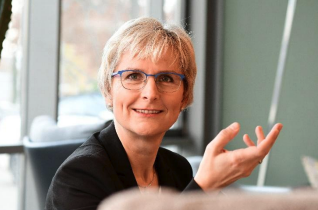Prof. Dr.-Ing. Regine Mallwitz studied electrical engineering and received the diploma degree at the Otto-von-Guericke-University Magdeburg, Germany, in 1994. After working on pulse power supplies for gas and solid-state lasers at LAMBDA PHYSIK (today: Coherent) Goettingen and LISA Laser Products Lindau in Germany she received the PhD degree in 1999 at the University of Kassel, Germany. 1999 she entered the company eupec in Warstein (today: Infineon Technologies) as R&D engineer and was responsible for the development of 1700V IGBT module family and strategic R&D until 2004. From 2005 to 2013 she held leading positions in the PV inverter R&D department at SMA Solar Technology, Germany.
In 2013, Regine was appointed full professor for Renewable Energies and Electromobility at University of Applied Sciences Fulda, Germany, and returned to academic research and teaching. Since 2014 she is full professor of Power Electronics at Technische Universität Carolo-Wilhemina Braunschweig, Germany, with a strong research focus on mobility (vehicle, aviation). She has been elected as the chairwoman of the power electronics departments in the German Association of Electrical, Electronics & Information Technologies (VDE). Inside the VDE she is scientific board member of the Power Engineering
Society (VDE-ETG). Her special scientific interests are the application of extreme fast switching power semiconductors and the system reliability under harsh conditions like in aircraft. She has been researching the electrification of aircraft for several years. Regine is principle investigator and board member of the Cluster of Excellence SE2A–Sustainable and Energy Efficient Aviation in Braunschweig-Hannover.
